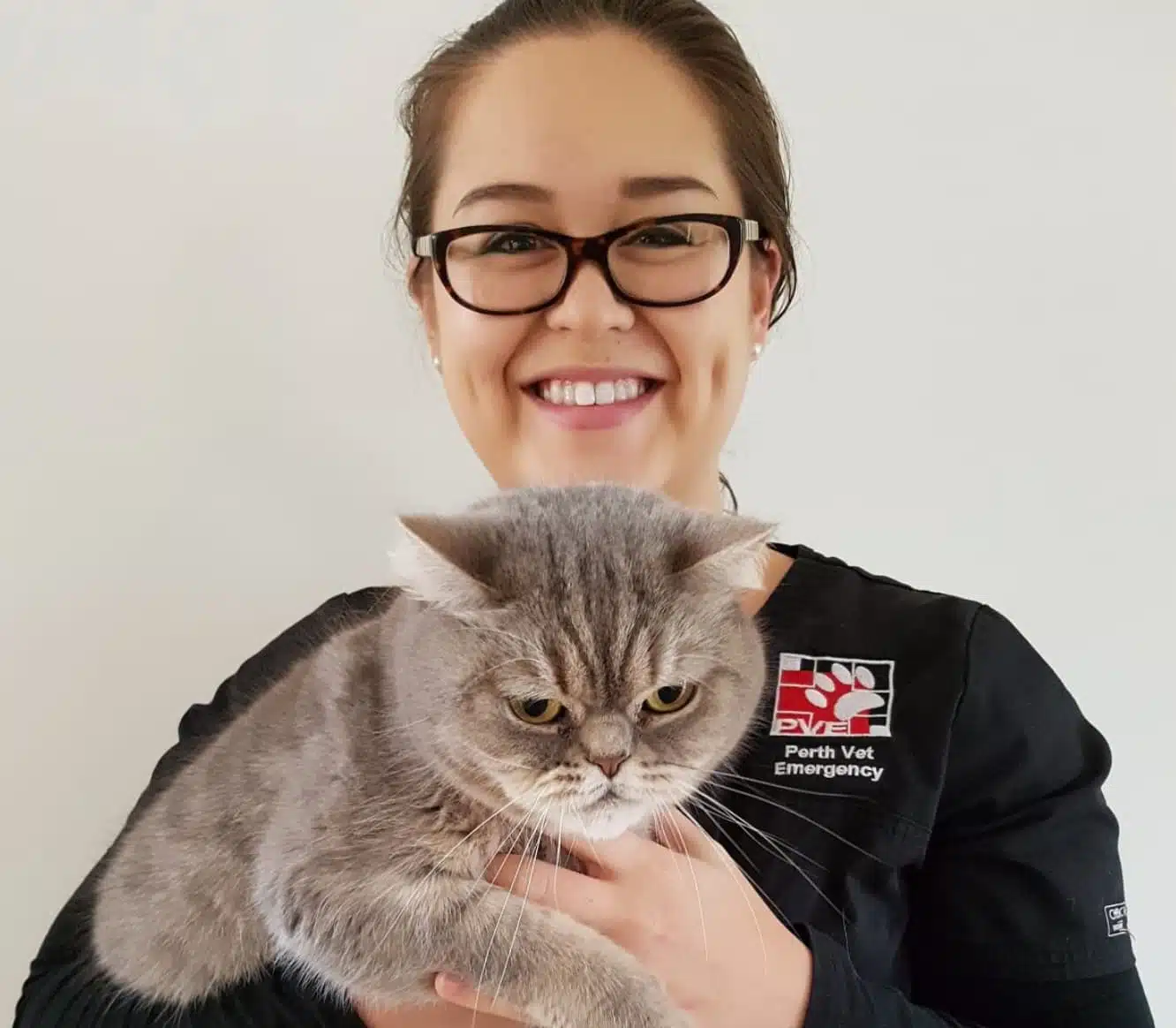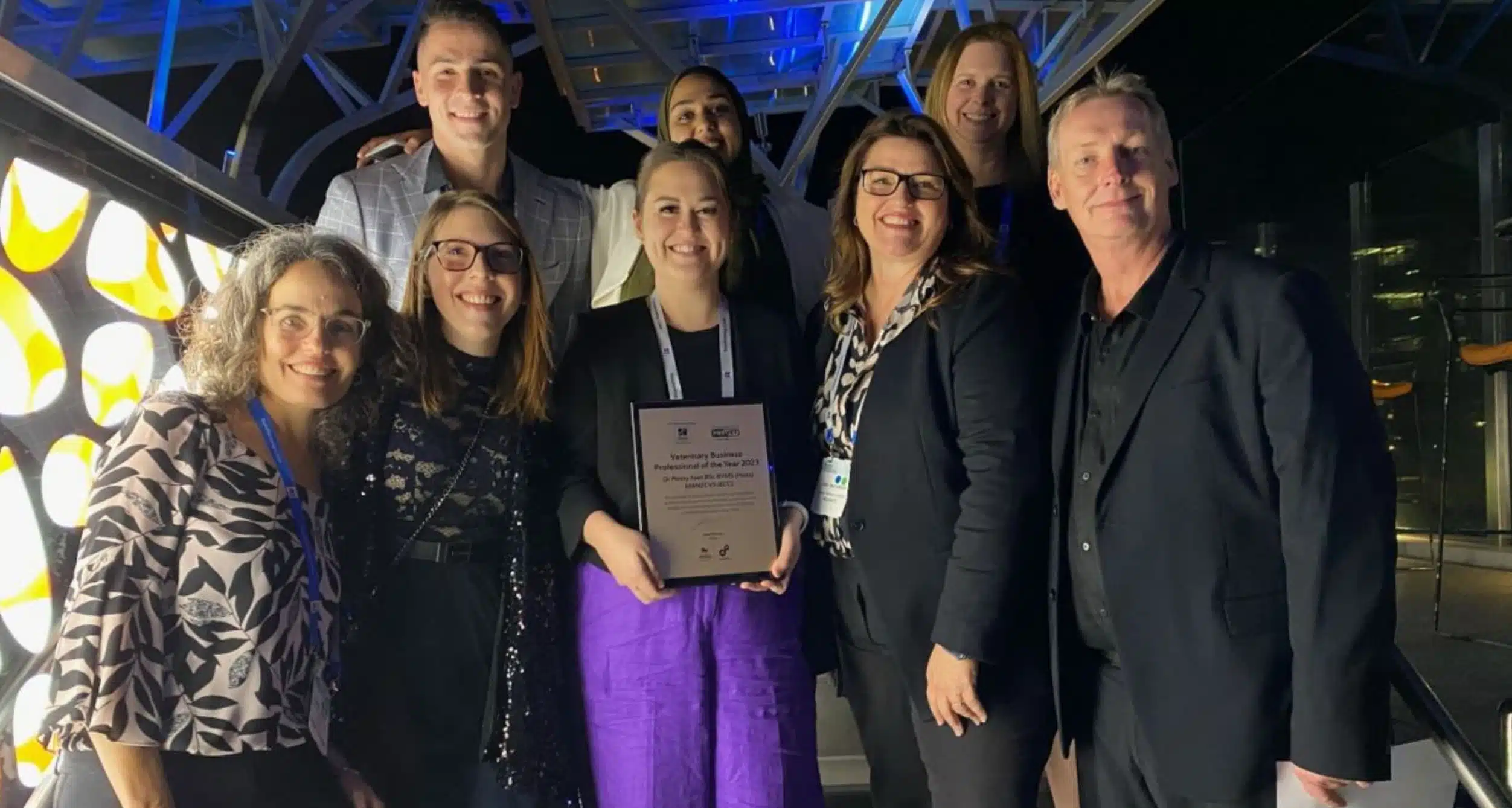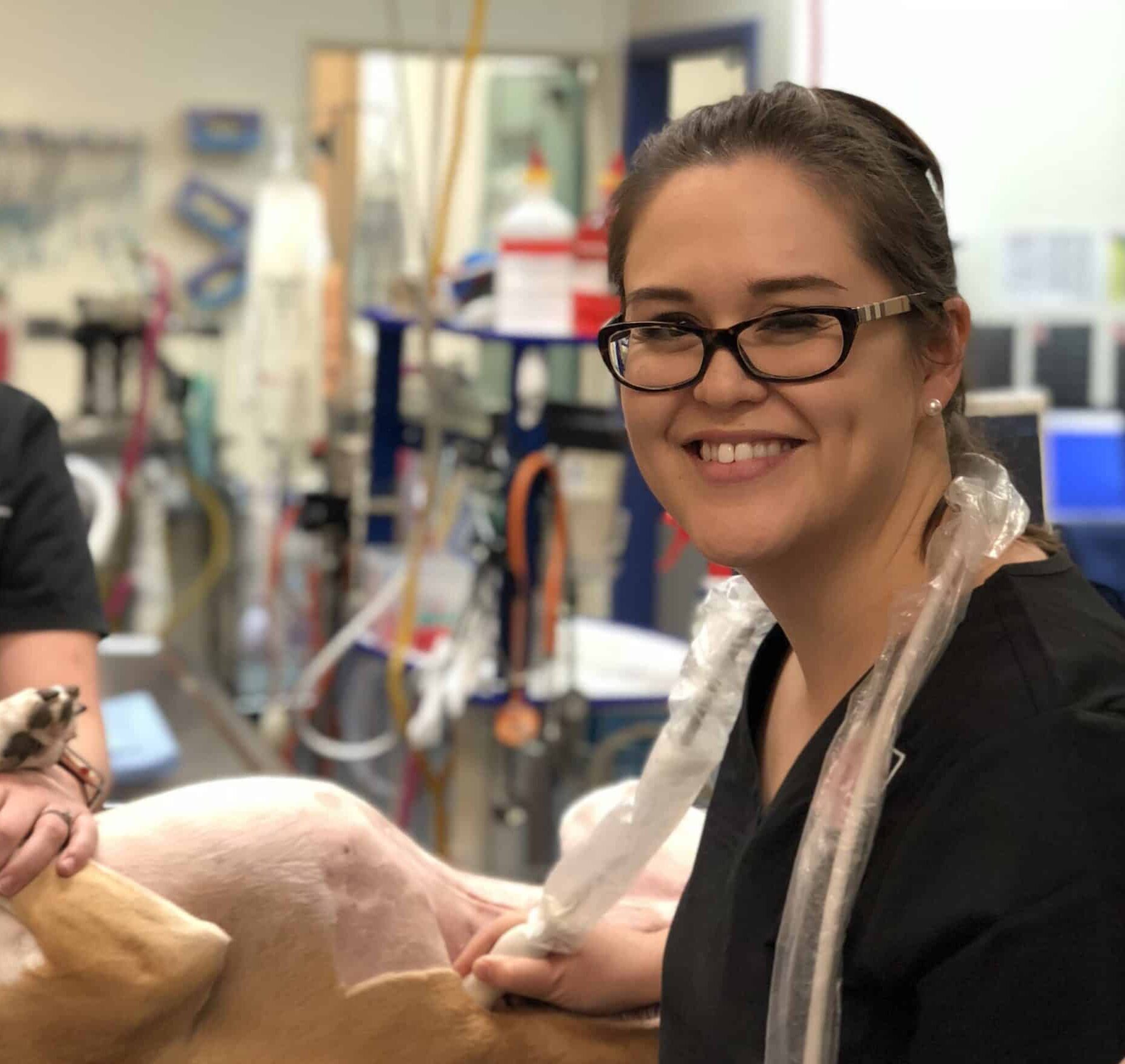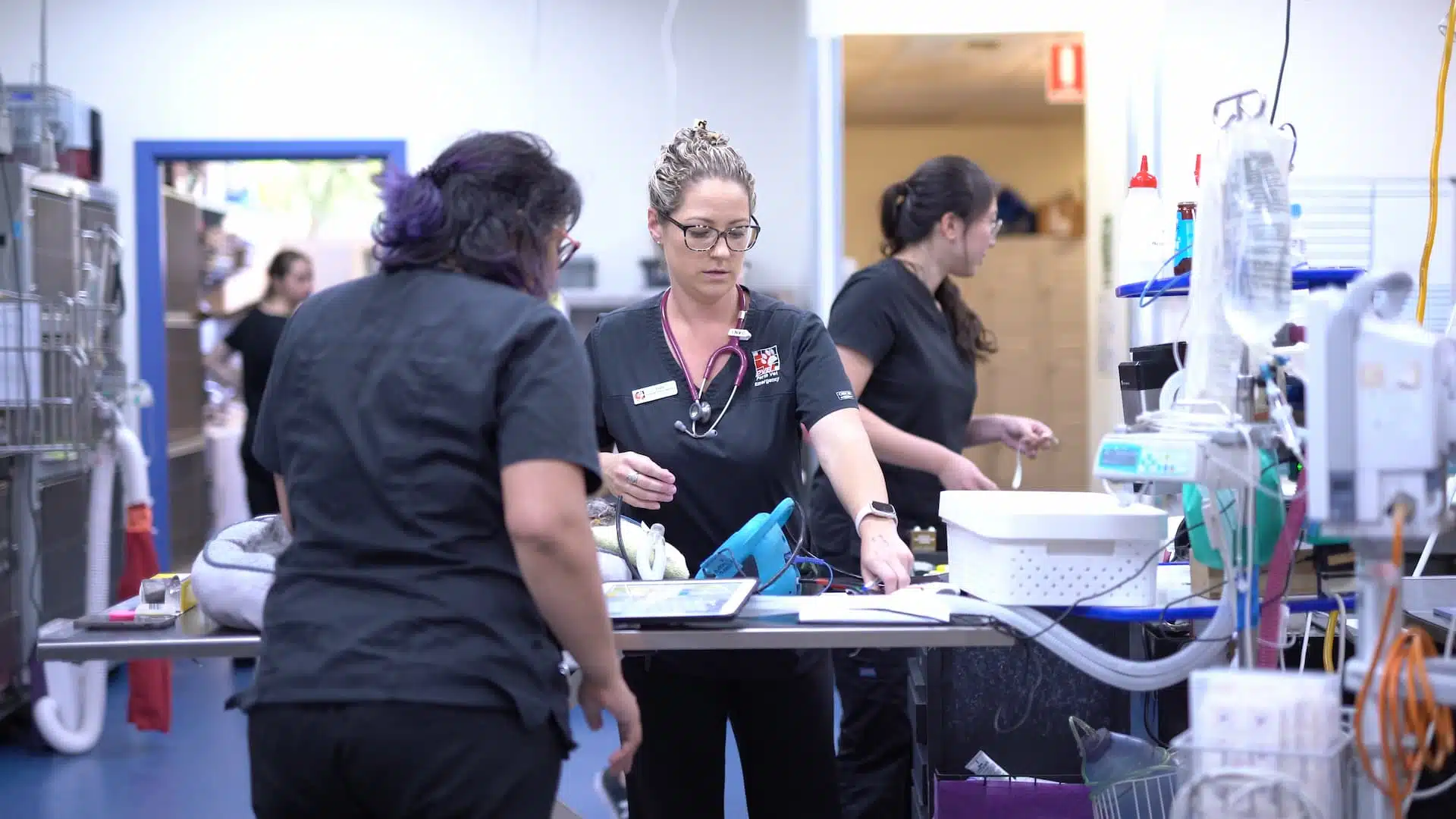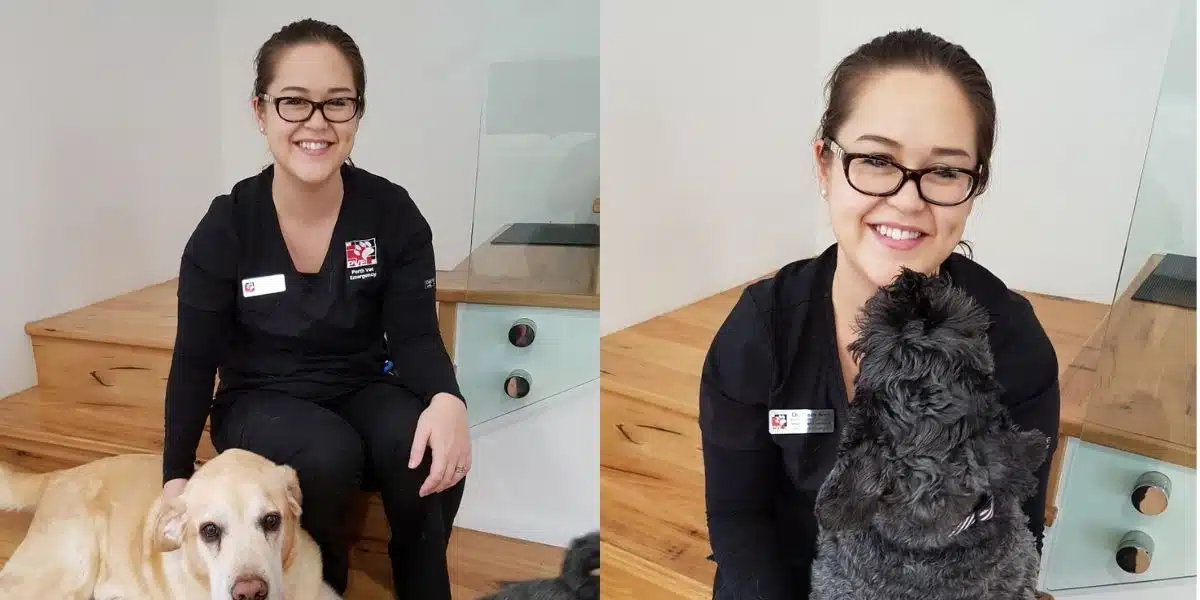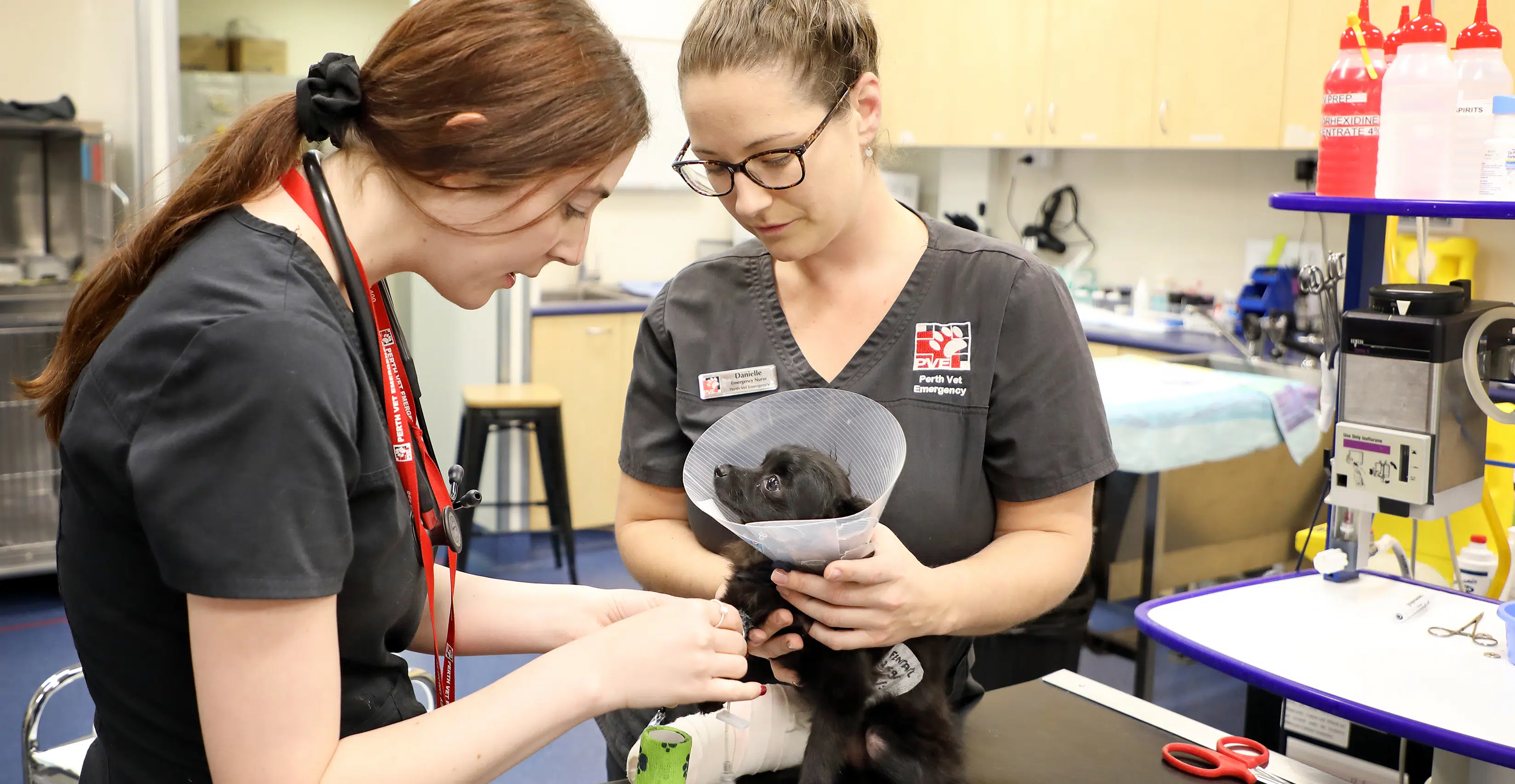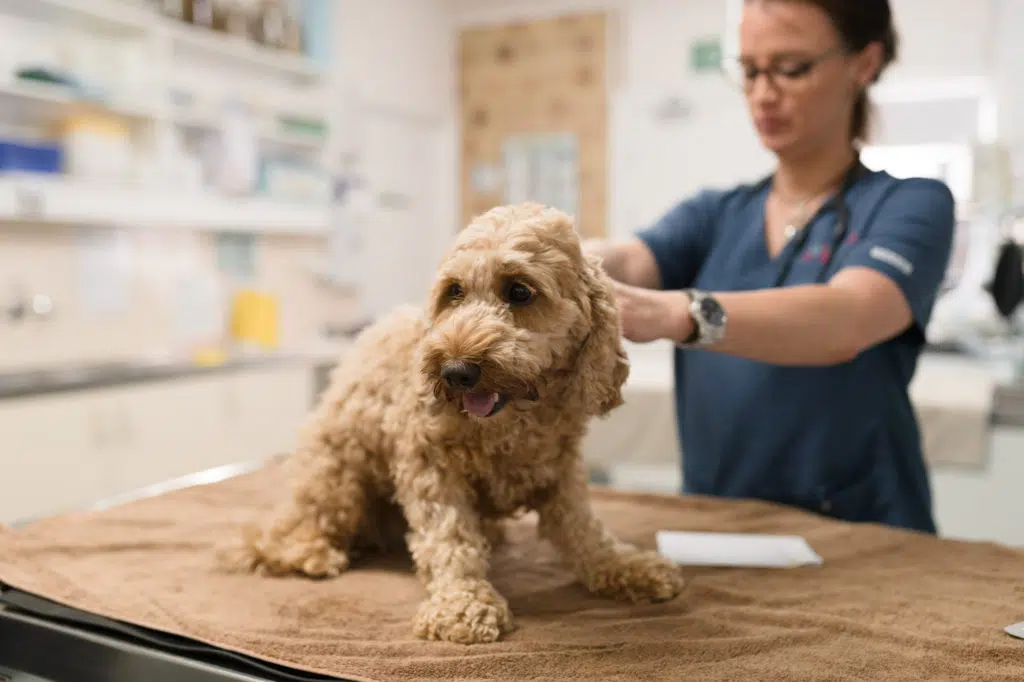We caught up with Dr Penny Seet, Hospital Director and Senior Veterinarian at Perth Veterinary Emergency, who was recently awarded the AVA Veterinary Business Professional of the Year. Hear Dr Penny’s journey from veterinary school to emergency, her valuable experiences and challenges along the way, and her dedication to patients and colleagues in the veterinary profession.
Q. Tell us a bit about how you started in the veterinary profession. Did you always see yourself working in emergency and critical care?
I did, actually. In final year rotations, at least back then at uni, you rotate through all the different disciplines. It’s an entirely clinical year and there are certain areas that people gravitate to and enjoy. I spent most of my final year hovering around in the Murdoch Pet Emergency Center instead of going to the departments that I was supposed to. I’m pretty sure that I spent my entire surgery rotation, looking after the surgery patients instead of watching surgeries. It was just wonderful!
Then when I graduated, I went into small animal general practice and it was great for a while, but I always sort of knew that I would go back to emergency. While I was at Uni, there were some really incredible mentors at MPEC who were either in the middle of residency programs, already fellows or boarded criticalists. Many of them have remained wonderful mentors for my whole career.
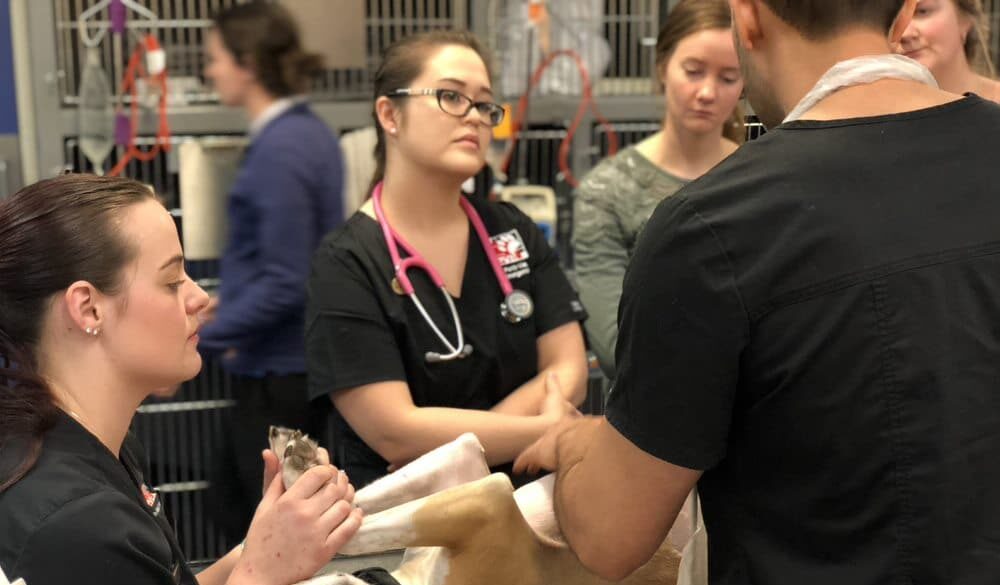
Dr. Penny oversees an ultrasound procedure at the Perth Veterinary Emergency Yokine hospital.
I reached out to some of them probably 18 months into general practice saying, “Hey, I’m getting a bit bored, what’s next?”. Murdoch had casual roles available, but as an 18-month-out vet, I just didn’t feel like I had the experience that I could go back there at that point. It felt like such a big responsibility to be there interacting with students.
I had these incredible memories of the vets and nurses who worked at MPEC at the time that weren’t the academics, they were the emergency team that worked there. Many of those I’ve stayed in contact with and have remained mentors. I just idolized them; I thought they were so amazing. I didn’t feel like I could be one of those people at 18 months out.
I stayed in general practice for a bit longer and then eventually one of those mentors opened her own emergency center at the end of 2009. She found me in general practice, emailed me and said, “I think you should come and work for me. I’m opening an emergency centre.” And I went, “Yes, I think that this sounds great!” because it was exactly what I was looking for. So it kind of all fell into place.
Q. Mentorship and support are vital for all veterinary professionals. What sort of mentorship did you have early on in your career? Are there any specific mentors you’d like to acknowledge?
During my final year of university, we were the first year that were really allowed to play vet in the emergency rotation. Prior to that, it was mostly observation. In our year, we were put directly in front of clients. We were told to have the conversations and then we would go and report back. And it was a great experience. I made mistakes while I was there, but it was a supportive environment that kind of nurtured me and allowed me to see that even in that high-stakes environment, there were people that were going to catch me and it would be okay.
That experience probably has framed how I feel now. That really did shape my career, and I feel really strongly about wanting to offer that experience to other younger vets also.
I can remember specific instances where those mentors kind of held my hand through doing first procedures, like my first snail pellet decontamination (gastric lavage and enema). I can remember the exact bench that we were on. I can remember intubating the patient, everything that the vet at the time said to me – I’m like a little chick that was imprinted, right? He now owns a general practice with his partner and is someone I reached out to for advice during the lead-up to opening our new hospital.
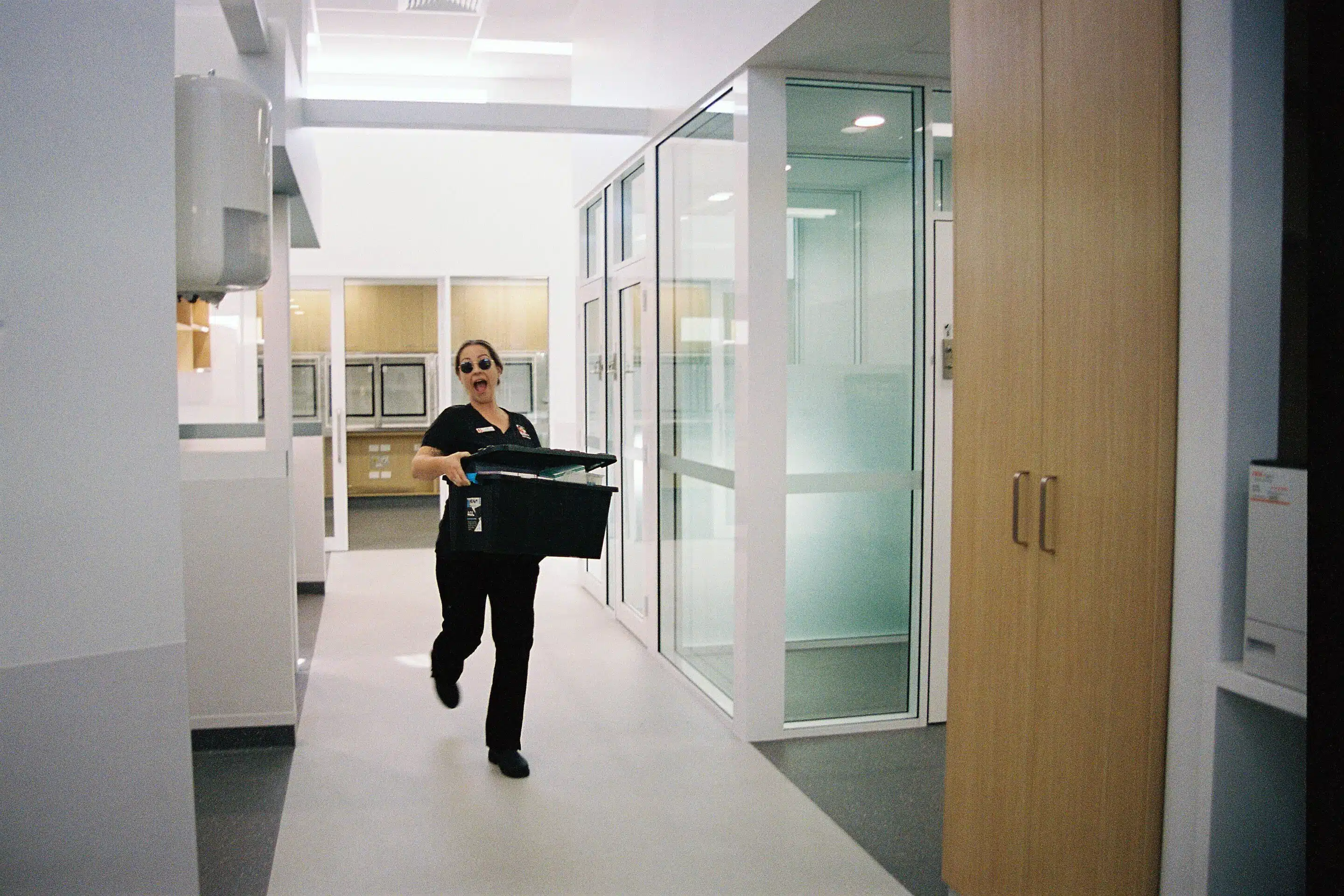
Dr. Penny excitedly bringing in supplies for the new PVE Cannington hospital.
Then in general practice, there were also incredible people who taught me how to communicate with clients and were supportive enough without smothering me – I actually really liked my independence as a fresh vet.
I remember my boss coming into my first few days of general practice and he just hovered outside the consult room door and it was kind of scary. So eventually I said, “Can you please just go away? You’re making me really stressed. I’ll call you if I need you.” And that was the best decision – it was support, at arm’s length. So I knew that I always had people that I could call but they weren’t actually hovering over my shoulder, making me feel like I was going to do something wrong. They were ready to catch me if things went wrong. And for me, that was the exact level of support that I needed.
Obviously, it varies from person to person. But certainly, I feel like that level of support kind of gave me enough opportunity to step up and have a go. Because the way that I approach challenges is that I don’t run out looking for them. Generally, a challenge will present itself and I’ll look around and go, “Well, it looks like no one else is going to sort this out. So I guess it’s going to be me.”
And that arm’s length support I think was really impactful and influential in helping me build confidence and resilience in those early stages, because it forced me to have a go.
Q. Being awarded Veterinary Professional of the Year is a huge achievement. Did you ever imagine having your work acknowledged like this?
No actually, to be honest with you.
It’s not an award that I even knew existed. We’re so busy at Cannington, with the stretch amongst our clinical team right now and all the things that need to be done. I sort of went, “Oh, okay, this is really amazing. But I really don’t think I can come to Brisbane because I’m on shift at 5 a.m. on the day when the award ceremony is.” Catherine and Jodi really encouraged me to go.
In my head, I thought, “I’m not going to win this award. There’ll definitely be some actual legitimate people out there who’ve done proper stuff and they will win.” I thought, “It’d be really nice to come and see you all and be at this evening and meet all the other nominees, but I just don’t think I can get there.”
Anyway, we actually did manage to get me over to Brisbane for the event. I thought I was just going to meet some other people who’ve been nominated and hang out with the AEA team and it’d be really great. They started presenting the award and they started telling a bit of my career story and I went, “Oh no, this is really happening…”
So it was a big surprise. The rest of the AEA team present actually knew I had won before I did, but it was such a lovely surprise. So wonderful to be acknowledged, but also a bit uncomfortable to be honest with you, because I would not have really been able to get anywhere without the leadership team that we have, and without the support that I have had at an AEA/Exec level.
It actually felt a bit disingenuous to accept an individual award when none of that is possible without the exceptional leadership team that has cycled uphill every part of the way alongside me. That team has ridden every wave with me, so I like to think of it as an acknowledgement of the team as a whole. And behind that leadership team, there was a growing PVE team who actually were busting their guts day in and day out to allow me the space to do everything that I needed to be doing – leading the Yokine business, and opening an entirely new hospital at Cannington.
Q. You’ve been part of the Perth Vet Emergency team for over a decade now. What’s kept you so motivated and dedicated over all these years?
Well, for starters, the team has changed. It’s been over 10 years. So we’ve had almost a complete evolution in that team. Certainly from when I very first joined the business under its previous ownership, there are really just a few team members who are still here. Some of those are in the leadership team and it’s wonderful to have them there with me because they understand the real journey that it has been.
But aside from that handful, we have almost completely new team members who have joined us at different points over the last 10+ years, which is normal in veterinary practice. My motivation and where I have been most passionate has definitely evolved over that time. Initially, I really loved being a vet. That was kind of my sole focus, even when we first took over the business. “I’m going to be the emergency vet that I can be”.
Next, I’m obsessed with cats, so “I’m going to be the best feline emergency vet that I can be.” Then I came to realise that there’s this actual pure joy that I find in the art of emergency practice that I think is just magical. There’s just not really any other way for me to describe it. That moment when there’s total chaos on the floor, but you have this team of people who understand each other and understand how to work around each other. And they’re like little planets just orbiting around each other at warp speed, getting all this stuff done and making magic.
And you have these incredible outcomes on the other side of that, and like you have made a real difference. And so then that developed into a real desire to share that joy with people. Because I just didn’t understand how people didn’t love this. I wanted them to see how wonderful it was.
As I developed further in my career that evolved into: “How can I influence the business and emergency practice and maybe the industry as a whole to find a way to make this career sustainable?” So that people can be in emergency for longer than two or three years before they burn themselves out. So that people can stay here and have a family and manage to balance the two. Or so that we could create a place that is so wonderful, that we have our team go off and travel, learn new skills – and then maybe come home and share those adventures and those new skills with us too!
So I think my eyes kind of opened to that as time went on. The focus then changed a bit to more of the business aspect, because it was more about sharing that joy. And I still love the clinical practice, right? Every time I’m there on shift, I think, “Oh, I really love this.” And I leave absolutely buzzing from a shift because I’ve just had the best time.
Q. As an experienced emergency and critical care veterinarian, what would you say are the main benefits of working in an emergency hospital?
It’s not a unique thing to feel the kind of joy that myself and a lot of our team feel about emergency practice, but it isn’t for everyone.
I think the things that are really wonderful are that evening though communication can be challenging, the work can be challenging, but it’s also so rewarding, and everything is high stakes. You form these really strong bonds with clients, with the team around you, with the patient that you’re treating. All of that is magic.
A lot of the time we have the ability to really get to the bottom of something in a really quick fashion.
In emergency practice, they’re really sick. So we get this patient and we try figure out what’s wrong with the patient, treat them at the same time, come up with a short-term plan and then hand them back to your primary care vet team and let them carry on. You need to know a little about a lot of things so you can identify the problem and take the next steps quickly.
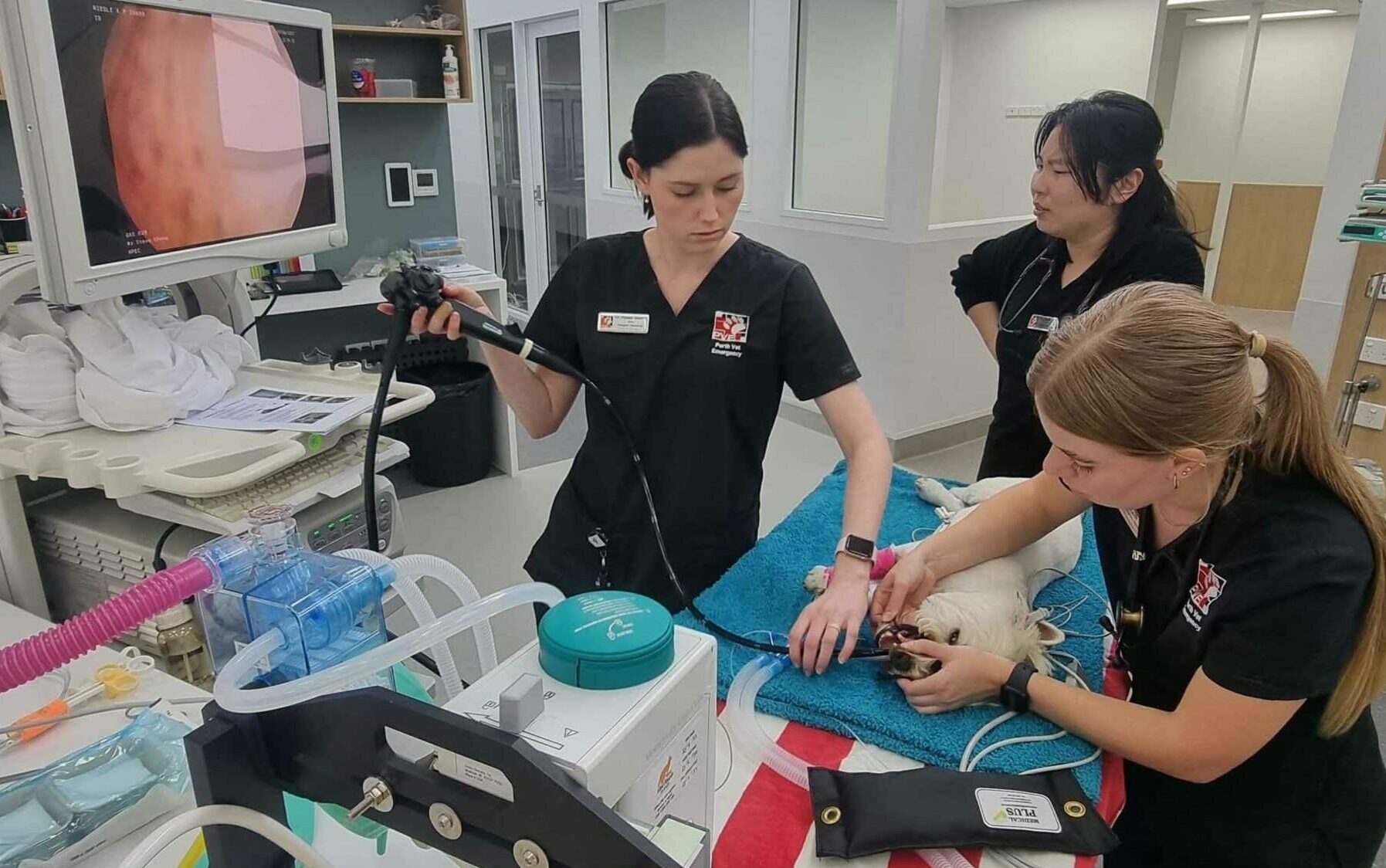
The team at the new PVE Cannington hospital perform a scoping procedure on a patient.
You can choose to dive deeper and know more about particular things. Like at PVE, we have lots of our team that are really cat-obsessed. There’s some of us who like little exotics and so there are different team members who have different special interests, the same as in general practice. But you do have to know a reasonable amount about a lot of stuff.
And then you just have to have this amazing ability to find the right resource to ask the questions when you’re presented with something you don’t know, which is great within our company. We have subscriptions to all of the things online that we need to: protocols, access to online resources and drug manuals. There are textbooks on the shelf but then there’s all these people that we can call within the company that give that to us on shift and off actually.
It’s interesting work and it’s impactful work.
So you know, whilst in other niches of veterinary practice like policy work, you have big influence over bigger picture stuff, and large animal practice, bigger picture impact like herd health. In general practice, you have this long lifelong bond with a family that is so meaningful and so deeply and personally impactful.
In emergency, that impact is also there because the circumstance requires hard, fast, relationship-building. For really critical stuff, the clients do remember you forever because the difference you make for their family can be so profound. It’s pretty special, meaningful work, really.
Q. What hobbies or interests do you have outside work hours to balance or enhance your passion for the veterinary profession?
As a mom of three children who are six and under, hobbies are a tricky thing right now.
I do personal training and have done probably for most of my shift work career. I’ve only stopped during pregnancies and immediately postpartum. That steady twice a week PT – it’s at regular intervals, I’m moving, getting those endorphins flowing. I have to get out of bed, it’s a set time, set place. So that routine has been really important to me.
Prior to kids, sitting down and reading a good book, like next to a pool or by the beach, that sort of thing was really wonderful. And then now with kids involved, it’s a lot more like, let’s go for a big walk, do outdoorsy stuff to run them around so that they don’t destroy the house from the inside out.
I love baking. There is just something quiet and mindful about just measuring stuff and mixing dry and wet ingredients together. I think probably most of my hobbies are quiet, relaxing type things. The work we do requires a lot of energy put into communication and connection, so I think at other times my brain needs to just chill out.
Q. To finish off, what advice would you give to recent graduates or even experienced veterinary professionals wanting to try their hand at emergency and critical care?
You need to find the right place for you. With the right level of support, and that has values that you identify with and means something to you.
You need to get real clarity on what the level of support is going to be. So for me, I really liked that at arm’s length, because hovering over me, I found that intimating and stressful. But for some new graduate vets, they may want someone right there holding their hand. And so it’s important to get real clarity from the practice that you’re going into, whether it’s emergency or elsewhere, what exactly does that support look like?
I think a lot of the time when that support is mismatched, if those expectations are not aligned that can lead to real frustration.
You’ve got to be really good at managing your health and how you look after yourself outside of work. You need to eat well, you need to move, you need to get sleep, you need to get sunshine. In Perth, you need air conditioning in summer. All of those things actually become vitally important.
Finding support networks and things outside of work is also crucial. Whether in general practice or emergency or government and policy, whatever you decide to do, you really need good mentors. They made such a difference to me. If you can find positive mentors, whether that’s at uni or when you graduate, maintain those relationships and reach out to those people for advice and support. Some of those people have given me the best advice of my career at challenging turning points. And some of them have given me really hard advice that I didn’t want to hear. As a young vet, you can cultivate those people in your life.
You absolutely have every chance of success if you can do that.
Want to learn more about Dr Penny Seet and the life-saving work of the Perth Veterinary Emergency team? Be sure to visit the official PVE website and explore the opportunities available with PVE.

